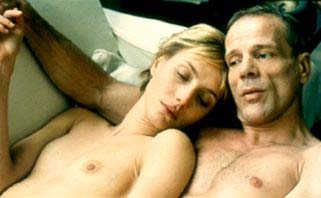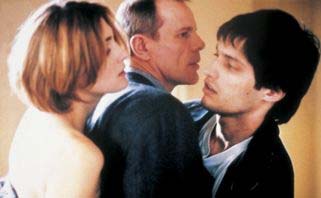
|
Greggory and his eyes - slightly bugged out of deep-set, skeletal sockets - certainly rank among the most powerful screen iconography of the last 20 years. Greggory's glances and postures cut celluloid with the intensity of a sculpture. As a movie star, Greggory resonates with the history of each of his pansexual characters. He's a cruelly, tragically aloof gay art critic (with 8-pack abs) in Those Who Love Me Can Take the Train and a proudly deluded (by a self-created masculine fascism) bisexual military man in Time Regained. He lecherously eyes power and his sister (and brothers? and mother??) in Queen Margot and endearingly, almost dashingly, fails to attain his ideal het love in Pauline at the Beach. What I mean to introduce here is the doubled-intensity of Greggory's characterizations that forms the catalyst of "Confusion of Genders". The spectator really can see the whole life of Greggory's characters in Greggory's eyes - and, consequently, the entirety of Greggory's own life experience, his passion in existence and in performing. In every performance, he provides the concrete reality of acting as political, spiritual, and - can it be separated? - sexual pursuit. That "reality" has created one of the great Myths of modern cinema: Greggory's presence always signifies empathy in action.
 In Confusion of Genders, Cohen utilizes the meticulous structure of farce,
replacing the myth of French sexual sophistication with Greggory's Myth.
Greggory's approach to the art inspires a new humanistic element in farcical
structures: sexual game-playing instigated by conflicted, unarticulated
disappointments and desires. Each of those motivating emotions is brought
out in the film's line-up of romantic obsessives - precisely through their
involvement with Greggory.
In Confusion of Genders, Cohen utilizes the meticulous structure of farce,
replacing the myth of French sexual sophistication with Greggory's Myth.
Greggory's approach to the art inspires a new humanistic element in farcical
structures: sexual game-playing instigated by conflicted, unarticulated
disappointments and desires. Each of those motivating emotions is brought
out in the film's line-up of romantic obsessives - precisely through their
involvement with Greggory.
"You should stop seeing each other," says a disgusted colleague to Greggory's Alain, a lawyer "in over his head" with Marc's trial, and his boss (and future wife) Laurence (Nathalie Richard). In response, Alain and Laurence share one of their conspiratorial laughs. Cohen does not invite the audience into their cynicism. "We're too old for fairy tales," Laurence convinces Alain to go through with the wedding. These are two very lonely people, but their bond is palpable. (After their "I do's," they crack up again.) Despite the wedding, Alain continues his relationship with Christophe (Cyrille Thouvenin), the 18-year-old brother of one of Alain's female dalliances. Greggory brings gay truth to the movies during the seduction scene at a party, nonchalantly "undressing him [Christophe] with his eyes" and then meeting Christophe out on the balcony. When shortly afterwards Alain pushes the always-lunging Christophe off of him in an elevator, he says: "I hate fags." Christophe laughs; he knows what's up. ("Do I look old?" Alain asks him, pride stricken, before making love.) As played by Thouvenin, complete with the over-eagerness and combination of early sophistication and naiveté of gay youth, there's no doubting why Alain confesses: "There's some kind of chemistry between us and it bothers me. I can't control it." Further losing control, Alain keeps returning to visit his client in prison because Marc turns him on. Marc, begging for the chance to see his girlfriend (who wants nothing to do with him; she only loved him for his cock), makes a deal: "Bring her and I'll fuck you." However, when the time comes for Alain to get what he desires, Alain reveals truer impulses. Stuck between Marc and his ex, Babette (Julie Gayet), Alain begs of Babette: "Help him!" - a signature Greggory moment when the concentrated stare of sexual interest turns into something deeper, a profound sympathy. ("He's looking at life," Alain bemoans. "We all are," Laurence reminds him.)
Cohen is no Patrice Chereau (Those Who Love Me Can Take the Train, Queen Margot), Raul Ruiz (Time Regained), or Eric Rohmer (Pauline at the Beach). However, in Confusion of Genders he ingeniously borrows some of their glory through Greggory. He includes the spectator's individual relationship to the Myth of Greggory into the film's farcical mix. It's explicit in the opening montage of Greggory's Alain conversing naked in bed with a cavalcade of male and female lovers (edited in isolated shot-reverse-shot): "I feel nothing," Alain explains; "But you've got a hard-on," one of his lovers responds. Similarly, the dramatic situations of Confusion of Genders allow the spectator to reflect on his/her relationship - various responses - to Greggory's persona. Through that peculiarly self-conscious method of movie-watching (mimicked in the characters' self-conscious, often piquant dialogue), Confusion of Genders exposes the confusion of loneliness and desire, of sex and of feeling, beneath contemporary romantic rituals. Thank God for Pascal Greggory. At the end, when Alain proves that "life is complicated," one suspects his loneliness, no matter how many lovers, is permanent. However, Greggory's final, resigned swagger away from the camera at the end cues a pop expression of Greggory's expansive reach: Jay Jay Johanson's "Alone Again" ("Hurting's close at hand / But I'm alone again"). We can feel the hurt. So we are not alone. |
|
 "I can see your whole life in your eyes." That's how Marc (Vincent
Martinez), an inmate convicted of murder, recognizes his lawyer Alain's
(Pascal Greggory) sexual attraction to him. In Confusion of Genders, it's
also the key line of dialogue: it expresses the wonderment of Pascal
Greggory's screen presence - the true subject of writer-director Illan Duran
Cohen's bisexual roundelay.
"I can see your whole life in your eyes." That's how Marc (Vincent
Martinez), an inmate convicted of murder, recognizes his lawyer Alain's
(Pascal Greggory) sexual attraction to him. In Confusion of Genders, it's
also the key line of dialogue: it expresses the wonderment of Pascal
Greggory's screen presence - the true subject of writer-director Illan Duran
Cohen's bisexual roundelay.
 Alain tells Babette: "When I was young, I was ugly. Girls didn't like me."
Alain and sexy, promiscuous Babette begin a tentative affair. Babette
communicates the state of being swept up in Alain's confusion: "Everything
was easier before meeting you." Babette even cuts her hair short to keep
Alain's interest, but she'll turn out okay, bonding with ex-convict Etienne
(Alain Bushung), who gives Marc love advice from magazines while sharing a
prison cell. Etienne's discomfort out of prison conveys a general malaise.
"You can have everything," Christophe promises Alain. "You can't have
everything," Laurence later chastises Alain. "I want a normal life," Alain
declares.
Alain tells Babette: "When I was young, I was ugly. Girls didn't like me."
Alain and sexy, promiscuous Babette begin a tentative affair. Babette
communicates the state of being swept up in Alain's confusion: "Everything
was easier before meeting you." Babette even cuts her hair short to keep
Alain's interest, but she'll turn out okay, bonding with ex-convict Etienne
(Alain Bushung), who gives Marc love advice from magazines while sharing a
prison cell. Etienne's discomfort out of prison conveys a general malaise.
"You can have everything," Christophe promises Alain. "You can't have
everything," Laurence later chastises Alain. "I want a normal life," Alain
declares.